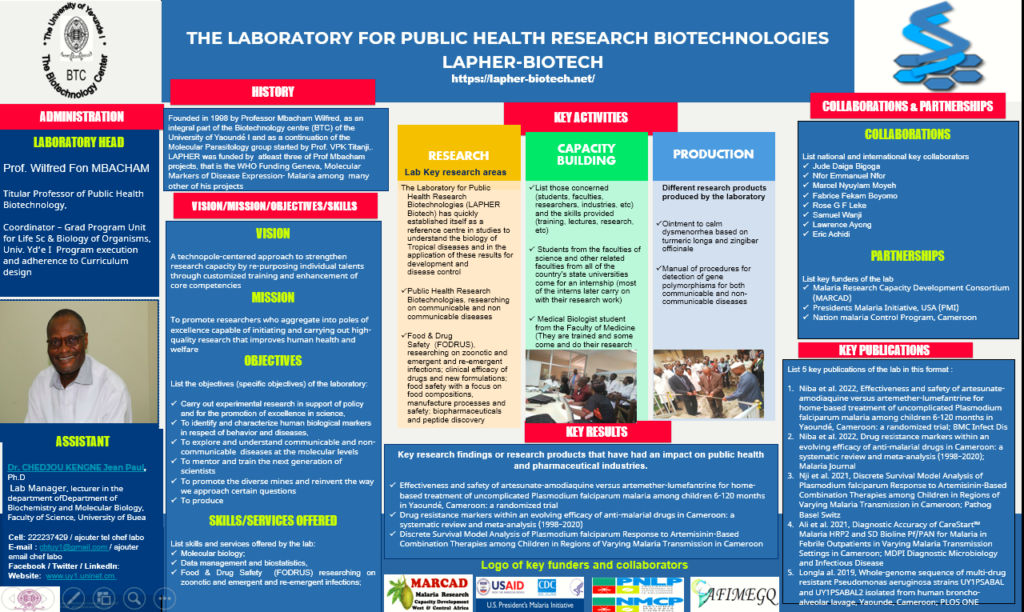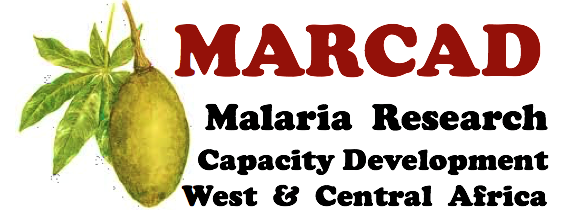RESEARCH WORKS


MARCAD
The Malaria Research Capacity Development Consortium (MARCAD) seeks to train a core group of African scientists in West and Central Africa who will be able to provide relevant answers for the control and elimination of malaria. One PhD and two post-docs fellows are hosted at each partner institution across five African countries (Mali, The Gambia, Cameroon, Ghana and Senegal).
The University Cheikh Anta Diop UCAD, Senegal (Prof O. Gaye) leads the Consortium which includes USTTB, Mali (Prof OK. Doumbo); MRC, The Gambia (Prof U. D’Alessandro); UY1, Cameroon (Prof W. Mbacham) and UHAS, Ghana (Prof HK. Tagbor). Three European institutions collaborate in this programme: LSHTM-UK, LSTM-UK and UoC, Denmark.
Postdoctoral fellows and PhD students are integrated into established research teams with senior scientists in participating institutions within a stimulated research environment. Strong mentorship from leading scientists is provided.
Main malaria research areas covered by the programme: parasite & vector resistance, immunology and molecular biology, changing epidemiology profile, interruption of transmission, changing behaviours, social sciences.
The programme is managed by a Steering Committee assisted by a Research Committee and an Advisory Board. MARCAD is committed to support women and provide high quality research contributing to the translation into policy and practice.
MARCAD Partner
End-of-subgrant Report
Introduction
All MARCAD partners are required to submit an end-of-subgrant
report that encapsulates key highlights of learning and outcomes during the
grant life. This report provides key achievements, challenges and lessons
learnt based on the DELTAS Africa Theory of Change and offers insights into what
was accomplished with the funds received towards MARCAD aims and objectives. The
information gathered from the reports will also help on the consortium end-of-grant
report and could inform future planning and strategy setting.
Report Coverage
The end-of-subgrant report covers the period from 1st
June 2016 to the date.
|
Name of Pogramme |
MARCAD |
|
Partner Name |
Professor Wilfred Fon MBACHAM |
|
Partner Institution Name |
BTC, UoY1, Cameroon |
1. Summary
Provide an overview of your programme achievements or discoveries,
within your institution, over the MARCAD grant period to date, and the
implications of these to the scientific community.
1 What have you discovered/achieved and what are the implications
of this work to knowledge, policy, and practice?
|
Outcome lay |
Change/Implication/Impact |
Insert a link to supporting document(s) |
|
|
On knowledge: A number of technologies were transferred to the laboratory: A number
On policy: The project of the fellows produced evidence for efficacy and safety of
Evidence was provided on the evolution of resistance markers on
On practice: The team was so equipped with clinical |
PMID: 34573898 PMID: 35357271 PMID: 35264170 PMID: 34578139
|
The overall major challenge during program implementation was the impact of Covid-19 on the various activities. The Covid-19 pandemic had a significant impact on the schedule, not only disrupting fellow exchange trips in terms of how long fellows could stay but also affecting the timeline for key deliverables. Mentoring was also difficult from the start of Covid-19. This Unforeseeable risk forced major readjustments to be made such as;
· Readjusting the timeline for key deliverables,
· Meetings via Zoom, lab schedule optimization, and working from home. And last but not least
· we resolved to mentor and collaborate with collaborators via Zoom and other communication channels.
Most of the deliverables were met as a result of the
changes made, and we gained a new perspective on how collaboration and
mentoring could be accomplished through various communication channels. As a result
of this experience, a teleconference hall has been established at the level of
the Biotechnology Centre for the purpose of future collaboration with external
collaborators as well as mentoring.